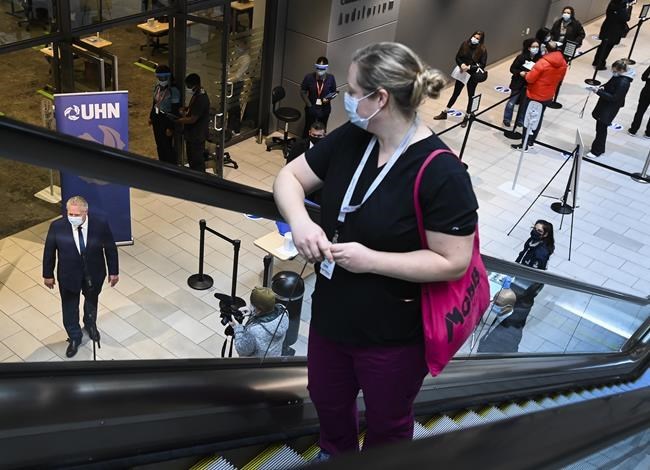Canada's first case of a new, more infectious variant of COVID-19 that surfaced in South Africa was found in Alberta on Friday, the same day two Atlantic provinces tightened their boundaries and Ontario warned tough new measures may be on the way if surging infection rates aren't reined in.
Alberta's chief medical health officer made the announcement about the new variant in a tweet late Friday afternoon. Dr. Deena Hinshaw said the person is believed to have contracted the illness while travelling and is in quarantine.
"There’s no evidence at this time that the virus has spread to others," Hinshaw said.
"I know any new case is concerning, but we are actively monitoring for these variants and working to protect the public’s health."
Late Friday, the Public Health Agency of Canada said that it had been in contact with Alberta and the province had confirmed "the first reported case of the South African variant in Canada."
Federal officials said earlier in the day that the new variant had yet to be detected in the country.
The South African variant, 501. V2, is more infectious than the original COVID-19 virus and has rapidly become dominant in that country's coastal areas. There have also been concerns among experts in the United Kingdom that vaccines may not be effective against it.
Fourteen cases of a more contagious COVD-19 variant that first surfaced in the U.K. have already been detected in Canada. Six of those were in Ontario, four were in Alberta, three were in British Columbia and one was in Quebec.
The news came as it was announced that, starting Saturday at 8 a.m., people entering Nova Scotia from New Brunswick will be required to isolate for two weeks.
"What we're saying here is, 'Do not go to New Brunswick, and New Brunswickers, do not come here, unless it is for essential purposes,'" said Nova Scotia Premier Stephen McNeil.
New Brunswick announced it would prohibit all non-essential travel into the province.
"It's that constant movement of people between cities, provinces, countries that has enabled COVID-19 to spread to every corner of the globe," said chief medical officer of health Dr. Jennifer Russell.
Nova Scotia reported two new cases, while New Brunswick had 18.
Meanwhile, the Manitoba government extended its COVID-19 restrictions, which were to expire Friday at midnight, for another two weeks to keep the demand on hospitals in check.
Since mid-November, restaurants and bars have been limited to takeout and delivery, and non-essential stores have shuttered except for curbside pickup. Public gatherings have been limited to five people and most social gatherings inside homes are forbidden.
The Prairie province reported 221 new COVID-19 cases Friday and nine additional deaths.
B.C. reported 617 new cases and 18 more deaths, bringing the total number of COVID-19 fatalities in the province to 988.
Ontario reported 4,249 new cases, still a record-breaking figure factoring in 450 earlier infections which were delayed in the tally. The province had 26 more deaths.
"If these basic measures continue to be ignored, the consequences will be more dire," Premier Doug Ford warned. "The shutdown won't end at the end of January. And we will have to look at more extreme measures."
He did not provide further details on the nature or timing of any added restrictions.
Ford has warned in recent days that the province is going to run out of vaccine if it does not receive another shipment soon. Federal Conservative health critic Michelle Rempel Garner said in a statement that the Liberal government has had months to take a leadership role.
But Prime Minister Justin Trudeau expressed confidence that Canada will have enough vaccine by the fall for everyone who wishes to be inoculated.
Trudeau said he and Canada's premiers discussed the vaccine rollout Thursday during a conference call.
"We agreed that it is vital that we work together as Team Canada to get vaccines delivered, distributed and administered as quickly and efficiently as possible."
Trudeau said more than 124,000 doses of the Pfizer-BioNTech vaccine were delivered to 68 sites across the country this week, and 208,000 more are to be delivered weekly for the rest of this month.
And, by the end of next week, more than 171,000 Moderna vaccine doses are expected to be delivered to provinces and territories.
In all, Trudeau said, Ottawa is on track to deliver about 1.3 million doses of both vaccines by the end of January, with quantities scaling up in February.
Those in charge of Canada's vaccine portfolio and the delivery schedule are confident that vaccines will be offered to all Canadians by September, he said.
"That will be significant in terms of getting through this pandemic and making sure that next winter looks very different from this one."
This report by The Canadian Press was first published Jan. 8, 2021
— With files from Chris Purdy in Edmonton and The Associated Press.
The Canadian Press
Note to readers: This is a corrected story. Previous version misspelled Dr. Deena Hinshaw's first name in para 2.




